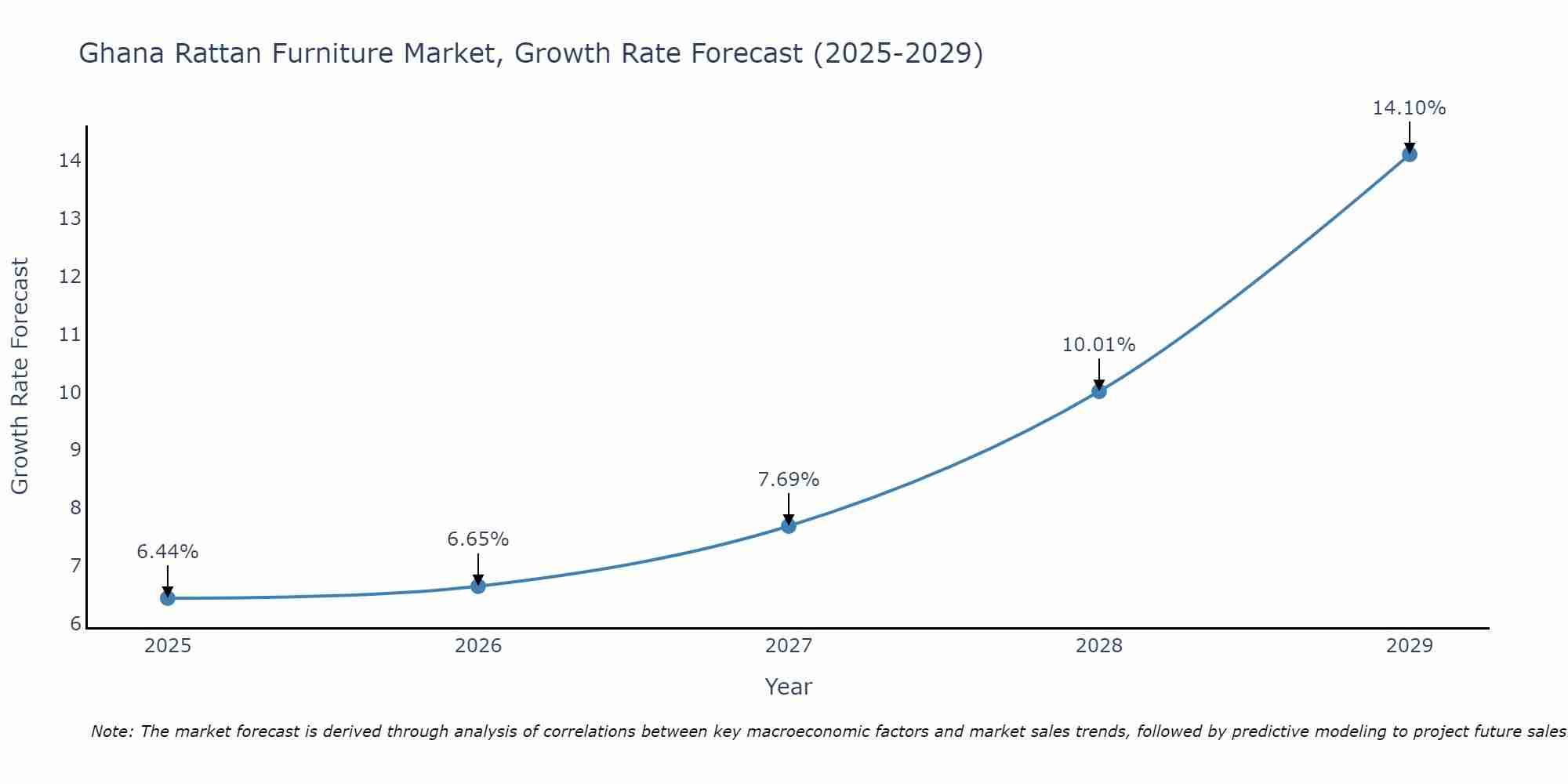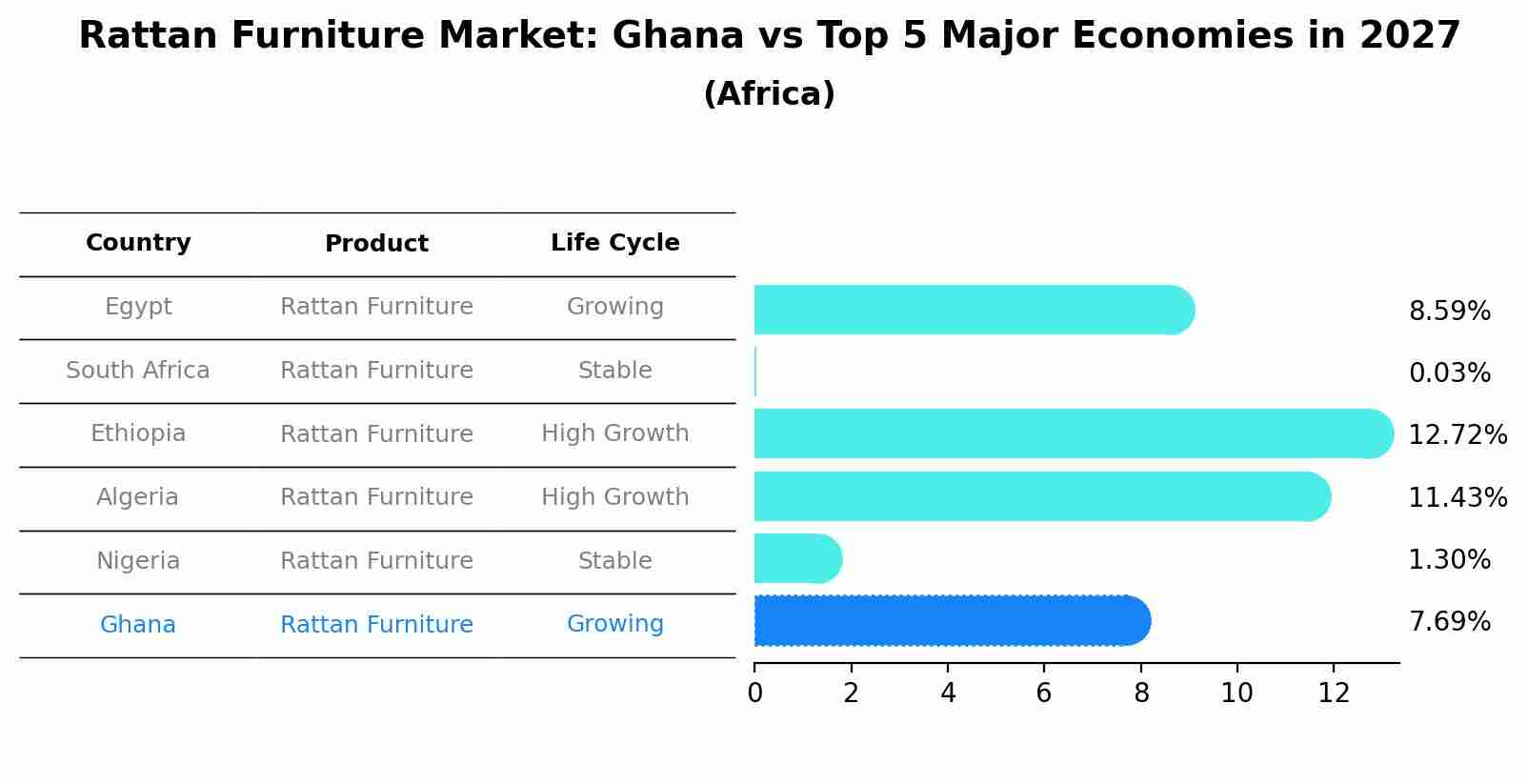Ghana Rattan Furniture Market (2025-2031) Outlook | Forecast, Value, Growth, Companies, Revenue, Share, Analysis, Size, Industry & Trends
| Product Code: ETC373016 | Publication Date: Aug 2022 | Updated Date: Jul 2025 | Product Type: Market Research Report | |
| Publisher: 6Wresearch | Author: Shubham Padhi | No. of Pages: 75 | No. of Figures: 35 | No. of Tables: 20 |
Ghana Rattan Furniture Market Size Growth Rate
The Ghana Rattan Furniture Market is poised for steady growth rate improvements from 2025 to 2029. The growth rate starts at 6.44% in 2025 and reaches 14.10% by 2029.

Rattan Furniture Market: Ghana vs Top 5 Major Economies in 2027 (Africa)
Ghana's Rattan Furniture market is anticipated to experience a growing growth rate of 7.69% by 2027, reflecting trends observed in the largest economy Egypt, followed by South Africa, Ethiopia, Algeria and Nigeria.

Ghana Rattan Furniture Market Synopsis
The Ghana Rattan Furniture Market is experiencing steady growth due to the increasing demand for eco-friendly and sustainable furniture options. Rattan furniture, known for its durability and natural aesthetics, has gained popularity among consumers looking to furnish their homes with stylish and environmentally conscious products. The market is characterized by a mix of local artisans and international brands offering a range of rattan furniture products such as chairs, tables, and sofas. With the growing trend towards conscious consumerism and a preference for natural materials, the Ghana Rattan Furniture Market is expected to continue expanding, driven by the country`s growing middle-class population and their appreciation for unique, handcrafted furniture pieces.
Ghana Rattan Furniture Market Trends
The Ghana Rattan Furniture Market is experiencing a growing trend towards sustainable and eco-friendly products, with consumers increasingly seeking environmentally conscious furniture options. There is a rising demand for rattan furniture due to its natural and renewable qualities, as well as its unique and stylish designs that cater to modern aesthetics. Additionally, there is a shift towards custom-made rattan furniture pieces to meet individual preferences and interior design requirements. The market is also witnessing an increase in online sales channels, providing consumers with greater accessibility and convenience when purchasing rattan furniture. Overall, the Ghana Rattan Furniture Market is evolving towards sustainability, customization, and digitalization to meet the changing preferences and needs of consumers.
Ghana Rattan Furniture Market Challenges
In the Ghana Rattan Furniture Market, some challenges that are commonly faced include limited access to quality raw materials, high production costs due to importation of materials, competition from cheaper alternatives such as plastic furniture, and lack of awareness and appreciation for rattan furniture among consumers. Additionally, inconsistent government policies and regulations related to the rattan industry can also hinder growth and investment in the market. Addressing these challenges will require efforts to improve supply chain management for raw materials, explore more sustainable sourcing options, educate consumers on the benefits of rattan furniture, and advocate for supportive policies to promote the growth of the rattan furniture industry in Ghana.
Ghana Rattan Furniture Market Investment Opportunities
The Ghana rattan furniture market presents several promising investment opportunities due to the growing demand for sustainable and eco-friendly furniture options. With increasing awareness of environmental issues and the shift towards more conscious consumer choices, there is a rising trend towards rattan furniture as it is a renewable resource that offers durability and aesthetic appeal. Investing in the Ghana rattan furniture market could be lucrative for investors looking to capitalize on this trend. Additionally, the country`s skilled artisans and craftsmen offer a competitive advantage in producing high-quality rattan furniture pieces for both local and international markets. Collaborating with local producers, exploring innovative designs, and leveraging e-commerce platforms for distribution could further enhance the growth potential in this market.
Jordan Agar Market Government Policies
The Ghanaian government has implemented several policies to support the rattan furniture market, recognizing its potential for economic growth and job creation. These policies include promoting sustainable sourcing of rattan materials through forest management regulations, providing financial incentives and support for rattan furniture manufacturers, and encouraging the adoption of environmentally friendly practices in the industry. Additionally, the government has actively engaged with stakeholders to address challenges such as access to finance, skills development, and market access for rattan furniture producers. Overall, the government`s policies aim to foster a thriving and competitive rattan furniture market in Ghana while ensuring sustainable resource management and environmental conservation.
Ghana Rattan Furniture Market Future Outlook
The Ghana Rattan Furniture Market is expected to witness steady growth in the coming years due to increasing consumer preferences for eco-friendly and sustainable furniture options. Rattan furniture`s durability, versatility, and natural aesthetic appeal are driving its popularity among consumers looking to furnish their homes, offices, and outdoor spaces. Additionally, the growing focus on interior design and home decor trends is expected to further boost the demand for rattan furniture in Ghana. The market is also likely to benefit from the rising disposable incomes, urbanization, and the expansion of the real estate sector in the country. However, challenges such as competition from alternative materials and fluctuations in raw material prices may impact the market`s growth trajectory. Overall, the Ghana Rattan Furniture Market shows promise for expansion and innovation in the foreseeable future.
Key Highlights of the Report:
- Ghana Rattan Furniture Market Outlook
- Market Size of Ghana Rattan Furniture Market, 2024
- Forecast of Ghana Rattan Furniture Market, 2031
- Historical Data and Forecast of Ghana Rattan Furniture Revenues & Volume for the Period 2021 - 2031
- Ghana Rattan Furniture Market Trend Evolution
- Ghana Rattan Furniture Market Drivers and Challenges
- Ghana Rattan Furniture Price Trends
- Ghana Rattan Furniture Porter's Five Forces
- Ghana Rattan Furniture Industry Life Cycle
- Historical Data and Forecast of Ghana Rattan Furniture Market Revenues & Volume By Type for the Period 2021 - 2031
- Historical Data and Forecast of Ghana Rattan Furniture Market Revenues & Volume By Table for the Period 2021 - 2031
- Historical Data and Forecast of Ghana Rattan Furniture Market Revenues & Volume By Chairs for the Period 2021 - 2031
- Historical Data and Forecast of Ghana Rattan Furniture Market Revenues & Volume By Storage for the Period 2021 - 2031
- Historical Data and Forecast of Ghana Rattan Furniture Market Revenues & Volume By Beds for the Period 2021 - 2031
- Historical Data and Forecast of Ghana Rattan Furniture Market Revenues & Volume By Others for the Period 2021 - 2031
- Historical Data and Forecast of Ghana Rattan Furniture Market Revenues & Volume By Application for the Period 2021 - 2031
- Historical Data and Forecast of Ghana Rattan Furniture Market Revenues & Volume By Residential for the Period 2021 - 2031
- Historical Data and Forecast of Ghana Rattan Furniture Market Revenues & Volume By Commercial for the Period 2021 - 2031
- Historical Data and Forecast of Ghana Rattan Furniture Market Revenues & Volume By Distribution Channel for the Period 2021 - 2031
- Historical Data and Forecast of Ghana Rattan Furniture Market Revenues & Volume By Multi-brand Stores for the Period 2021 - 2031
- Historical Data and Forecast of Ghana Rattan Furniture Market Revenues & Volume By Exclusive Stores for the Period 2021 - 2031
- Historical Data and Forecast of Ghana Rattan Furniture Market Revenues & Volume By Online for the Period 2021 - 2031
- Historical Data and Forecast of Ghana Rattan Furniture Market Revenues & Volume By Other Distribution Channel for the Period 2021 - 2031
- Ghana Rattan Furniture Import Export Trade Statistics
- Market Opportunity Assessment By Type
- Market Opportunity Assessment By Application
- Market Opportunity Assessment By Distribution Channel
- Ghana Rattan Furniture Top Companies Market Share
- Ghana Rattan Furniture Competitive Benchmarking By Technical and Operational Parameters
- Ghana Rattan Furniture Company Profiles
- Ghana Rattan Furniture Key Strategic Recommendations
Frequently Asked Questions About the Market Study (FAQs):
- Single User License$ 1,995
- Department License$ 2,400
- Site License$ 3,120
- Global License$ 3,795
Search
Thought Leadership and Analyst Meet
Our Clients
Related Reports
- South Africa Stationery Market (2025-2031) | Share, Size, Industry, Value, Growth, Revenue, Analysis, Trends, Segmentation & Outlook
- Afghanistan Rocking Chairs And Adirondack Chairs Market (2026-2032) | Size & Revenue, Competitive Landscape, Share, Segmentation, Industry, Value, Outlook, Analysis, Trends, Growth, Forecast, Companies
- Afghanistan Apparel Market (2026-2032) | Growth, Outlook, Industry, Segmentation, Forecast, Size, Companies, Trends, Value, Share, Analysis & Revenue
- Canada Oil and Gas Market (2026-2032) | Share, Segmentation, Value, Industry, Trends, Forecast, Analysis, Size & Revenue, Growth, Competitive Landscape, Outlook, Companies
- Germany Breakfast Food Market (2026-2032) | Industry, Share, Growth, Size, Companies, Value, Analysis, Revenue, Trends, Forecast & Outlook
- Australia Briquette Market (2025-2031) | Growth, Size, Revenue, Forecast, Analysis, Trends, Value, Share, Industry & Companies
- Vietnam System Integrator Market (2025-2031) | Size, Companies, Analysis, Industry, Value, Forecast, Growth, Trends, Revenue & Share
- ASEAN and Thailand Brain Health Supplements Market (2025-2031) | Strategy, Consumer Insights, Analysis, Investment Trends, Opportunities, Growth, Size, Share, Industry, Revenue, Segments, Value, Segmentation, Supply, Forecast, Restraints, Outlook, Competition, Drivers, Trends, Demand, Pricing Analysis, Competitive, Strategic Insights, Companies, Challenges
- ASEAN Bearings Market (2025-2031) | Strategy, Consumer Insights, Analysis, Investment Trends, Opportunities, Growth, Size, Share, Industry, Revenue, Segments, Value, Segmentation, Supply, Forecast, Restraints, Outlook, Competition, Drivers, Trends, Demand, Pricing Analysis, Competitive, Strategic Insights, Companies, Challenges
- Europe Flooring Market (2025-2031) | Outlook, Share, Industry, Trends, Forecast, Companies, Revenue, Size, Analysis, Growth & Value
Industry Events and Analyst Meet
Whitepaper
- Middle East & Africa Commercial Security Market Click here to view more.
- Middle East & Africa Fire Safety Systems & Equipment Market Click here to view more.
- GCC Drone Market Click here to view more.
- Middle East Lighting Fixture Market Click here to view more.
- GCC Physical & Perimeter Security Market Click here to view more.
6WResearch In News
- Doha a strategic location for EV manufacturing hub: IPA Qatar
- Demand for luxury TVs surging in the GCC, says Samsung
- Empowering Growth: The Thriving Journey of Bangladesh’s Cable Industry
- Demand for luxury TVs surging in the GCC, says Samsung
- Video call with a traditional healer? Once unthinkable, it’s now common in South Africa
- Intelligent Buildings To Smooth GCC’s Path To Net Zero


















